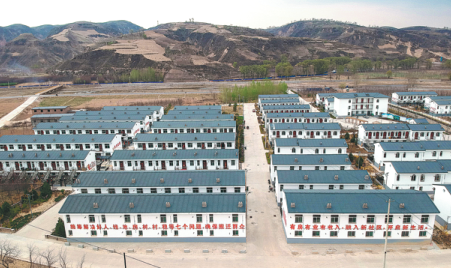Relocated residents embrace life with greater opportunities
Updated: 2020-08-07

New houses have been built in Houshimen village for residents moving from their old residences in Shanghuliang village in the same county. [Photo by Bai Xuping for China Daily]
On the production line of a garment company in the Donghui Poverty-Reduction Industrial Park in Yushe county in the east of Shanxi province, employees keep busy sorting fabric and working on sewing machines.
The workers hail from nearby mountainous, poverty-stricken villages, but have now relocated to new settlements in Donghui village to take on employment at the industrial park.
"It's more comfortable to live in the new houses and more convenient to work in the neighborhood," said Li Yanxia, an employee at the garment company. "While earning salaries from the company, we can still make money from the rental of farmland in our old village."
According to the Shanxi Poverty-Reduction Office, a total of 362,000 impoverished people in Shanxi have benefitted from a poverty-relief relocation campaign in the province. They moved from their old communities in underdeveloped mountainous areas to 1,502 new settlements with better living conditions, more complete infrastructure and better job and business opportunities.
The relocation campaign began in 2016, after the provincial government of Shanxi issued the 13th five-year plan (2016-20) on relocation for poverty reduction.
Shanxi's impoverished populations were mostly located in the regions in the Taihang and Lyuliang mountains as well as high-altitude, cold areas in the north of the province.
According to the plan, the relocation program would require a total investment of 20.8 billion yuan ($2.99 billion). It was implemented in 71 counties in 11 cities.
Construction on the province's first new settlement for poverty alleviation began in Xiaxian county on Oct 7, 2016, and the last of the 1,502 settlements was completed on Sept 30, 2019.
Residents in Qingxingtou village in Pingshun county were among the first to move to their new settlement.
When recalling the living environment of their old community, Guo Xianzhong, Party secretary of the village, said:"There was no flat and fertile land for farming and road connectivity was poor. Villagers could not find opportunities to make more money."
In December 2016, the residents moved to their new settlement in the nearby plain area. Paved roads were built and every household had access to running water. There was a school for children and a medical clinic for local patients.
Ruan Hanxin, a 70-year-old farmer from Shanghuliang village in Xingxian county, said he was satisfied with his new residence in the new settlement in nearby Houshimen village.
His family spent only 8,000 yuan on moving into the new house in Houshimen, which is equipped with running water, electricity and central heating.
"I never expected to live in a new house with the same facilities as those in big cities," Ruan said.
For the authorities in Shanxi, the relocation program is not a simple project of building houses.
According to the province's poverty-reduction office, the campaign involves the construction of supporting facilities; the creation of job and business opportunities; community management; ecological recovery and farmland reclamation in the old villages.
"The relocation for poverty reduction also aims to achieve balanced socioeconomic and ecological development," said one local official.
Xinyuan village in Fansi county reclaimed about 4 hectares of new farmland from the removed old residences after all its villagers moved to a new settlement. All the 90 hectares of farmland was leased to a farming company that pays rent to villagers on an annual basis.
"We now make more money by working for companies in the neighborhood and receiving rent from the farming company," said Yang Bingyi, a local resident.
Liu Caixia, a farmer who moved from Jingzi village in Heshun county to a new settlement in the county seat last year, said she is satisfied with the convenience of the community and its more complete facilities.
"We have a clinic and a primary school in the community to meet our needs in health care and children's eduction. We can also buy everything here with a couple of shopping facilities in the neighborhood," Liu said, adding that she is even happier to be employed by a local company where she is decently paid.
According to the provincial poverty-reduction office, the relocated residents are offered better business and job opportunities with the development of industries with local characteristics, including manufacturing, modern farming, rural tourism and handicraft production.
Li Quanhong contributed to this story.



